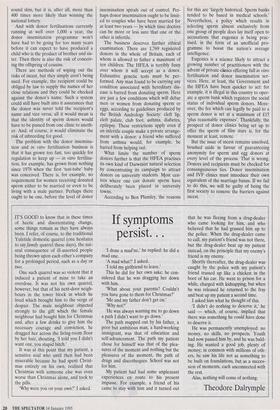If symptoms persist. . .
IT'S GOOD to know that in these times of hectic and disorientating change, some things remain as they have always been. I refer, of course, to the traditional Yuletide domestic quarrel (one hesitates to say family quarrel these days), the nat- ural consequence of ill-assorted people being thrown upon each other's company for a prolonged period, such as a day or two.
One such quarrel was so violent that it induced a patient of mine to take an overdose. It was not his own quarrel, however, but that of his next-door neigh- bours in the tower block in which he lived which brought him to the verge of despair. The male neighbour objected strongly to the gift which the female neighbour had bought him for Christmas and, after a few drinks to give him the necessary courage and conviction, he dragged her across the living-room floor by her hair, shouting, 'I told you I didn't want one, you stupid bitch.'
It was at this point that my patient, a sensitive soul who until then had been miserable because he had spent Christ- mas entirely on his own, realised that Christmas with someone else was even worse than Christmas alone, and took to the pills.
`Why were you on your own?' I asked. `I done a mad'ne,' he replied: he did a mad one.
`A mad what?' I asked.
`I told my girlfriend to leave.'
This he did for her own sake: he con- sidered that he was dragging her down with him.
`What about your parents? Couldn't you have gone to them for Christmas?' `Me and my father don't get on.'
`Why not?'
'He was always wanting me to go down a path I didn't want to go down.'
The path mapped out by his father, a poor but ambitious man, a hard-working immigrant, was that of education and self-advancement. The path my patient chose for himself was that of the plea- sures of the moment and nothing but the pleasures of the moment, the path of drugs and discotheques. School was not for him.
My patient had had some unpleasant experiences en route to his present impasse. For example, a friend of his came to stay with him and it turned out that he was fleeing from a drug-dealer who came looking for him, and who believed that he had grassed him up to the police. When the drug-dealer came to call, my patient's friend was not there, but the drug-dealer beat up my patient instead, on the principle that my enemy's friend is my enemy.
Shortly thereafter, the drug-dealer was caught by the police with my patient's friend trussed up like a chicken in the boot of his car. He went to prison for a while, charged with kidnapping, but when he was released he returned to the fray and beat up my patient a second time.
I asked him what he thought of this.
`I didn't do nothing to deserve it,' he said — which, of course, implied that there was something he could have done to deserve it.
He was permanently unemployed: no money, no skills, no prospects. Youth had now passed him by, and he was bald- ing. He wanted a good job, plenty of money; in common with millions of oth- ers, he saw his life not as something to be built on foundations, but as a succes- sion of moments, each unconnected with the rest.
Alas, nothing will come of nothing.
Theodore Dalrymple









































 Previous page
Previous page